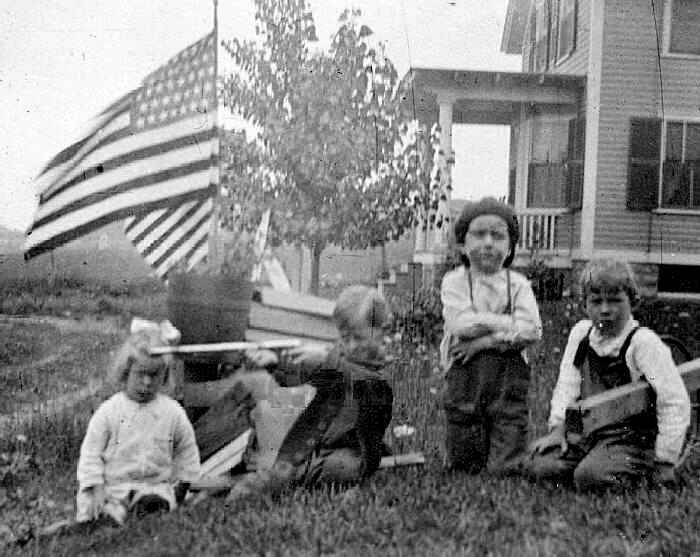
World War I: American Nationalism

Figure 1.--Many Europeans doubted that the United States with its polyglot population could develop a viable national ethos. Ironically, it would be America that would played a key role in demolishing the European empires and reconstructing Europe on the basis of national self-determination.q This snapshot was taken in 1914. Nlte the pre-1913 str arrangement.
|
|
The rise of nationalism in Europe was a major factor in World war I. America was not imune from this as can be seen by the outburst of nationalism in the Spanish American War (1898-99). America by the turn-of-th 20th century had become the world's most powerful industrial nation, albeit without a large army. Perhaps because of this and American isolationist policies , most Europeans did not include America in their security calculations. The Europeans most concerbed with America was the British who until World War I saw Amrica as more of a rival than an ally. The British were not entirely sure how to assess America. The industrial prowess was incovertable. Some British observers dounted, however, that a country without a long shared national experience on the European model and with a polygot population could be a great nation. A factor here is that the European nationalism of the late-19th and early-20th century had become imbued with race. America even befoe the European migration of the late-19th and early-20th century had been a diverse nation. By the time of World War II with large-scale immigration from Italt, Eastern-Europe and Scabdninavia, America had becomeethnically a microcosm of Europe. The United States managed, however,to absorb the many varied peoples and within a single generation teansform them into fervent patriots. Here America's public education system as well as uonprecedented economic opportunity played key roles. True there were afinities with their ancestral homelands, byt American nationalism was afervent as that of any Europen country. The basis for that natinalism was not ethnicity, but rather a shared belief in principles, democracy, the rule of law, and individual rights. The idea that a new nation could establish a national ethos on such principles was questioned by many Europeams. Iroinically, the British worked mightly to being the country that they doubted to enter the war. And America whose largest immigrant was the Germans, plyeda key role in destroying the Germany Empire and preventing Germany hegemony in Europe. And American nationalism through President Wilson's promotion of national self-determination resulted in the reshaping of Europe into ethnically and linguistically based nation states.
CIH

Navigate the CIH World War I Pages:
[Return to Main American World War I page]
[Return to Main American enters World War I page]
[Aftermath]
[Alliances]
[Animals]
[Armistace]
[Biographies]
[Causes]
[Campaigns]
[Casualties]
[Children]
[Countries]
[Declaration of war]
[Deciding factors]
-------[Diplomacy]
[Economics]
-------[Geo-political crisis]
[Home front]
[Intelligence]
[Military forces]
[Neutrality]
[Pacifism]
[People]
[Peace treaties]
[Propaganda]
[POWs]
[Russian Revolution]
[Terrorism]
[Trench warfare]
------[Technology]
[Weaponry]
[Bibliographies]
[Contributions]
[FAQs]
[Images]
[Links]
[Registration]
[Tools]
[Return to Main World War I page]
[Return to Main war essay page]
[Return to CIH Home page]
Created: 12:43 AM 11/5/2008
Last updated: 12:43 AM 11/5/2008



